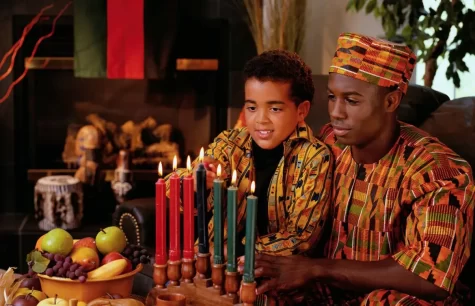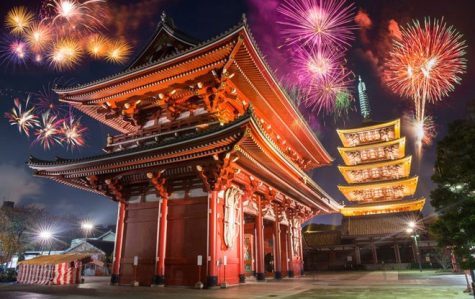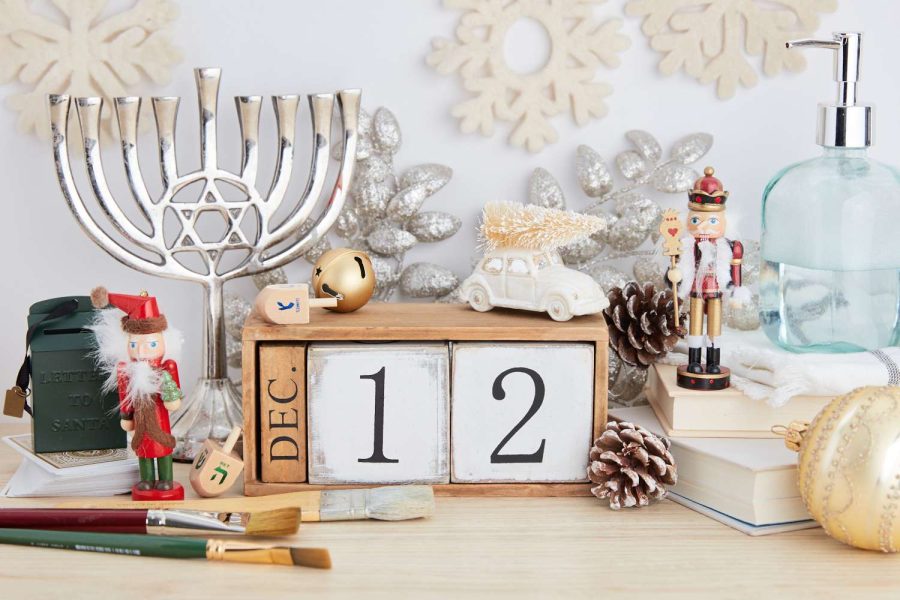How the Winter Season Interconnects our Cultures
December 2, 2022
In the month of December people solely focus on Christmas, but there are so many more traditions and celebrations happening around this time. All over the world people celebrate different religious holidays. The reason a lot of them fall in December is because of the lunar calendar and the winter solstice. Of course, this is not the case for all of the holidays, like Christmas and Hanukkah, which are celebrated to commemorate certain events that had taken place on certain days. In total there are 14 different religious holidays celebrated in December. This doesn’t include the different variations of holidays, like Christmas, which is celebrated in many different forms all over the world. Some of the most commonly celebrated December holidays are Hanukkah, Christmas, Kwanzaa, Boxing Day, and Ōmisoka
 Hanukkah also known as Chanukah is a Jewish celebration that lasts eight days. It begins on the 25th of Kislev on the Hebrew calendar. This celebration commemorates the rededication of the Second Temple in Jerusalem after the Maccabean Revolt. This Revolt was when Jews had risen up against their Greek-Syrian oppressors. The people that were involved in the rededication witnessed what they believed to be a miracle. The temple lantern that was lit had only enough oil to keep it burning for a day, but the flames continued to burn for eight nights.
Hanukkah also known as Chanukah is a Jewish celebration that lasts eight days. It begins on the 25th of Kislev on the Hebrew calendar. This celebration commemorates the rededication of the Second Temple in Jerusalem after the Maccabean Revolt. This Revolt was when Jews had risen up against their Greek-Syrian oppressors. The people that were involved in the rededication witnessed what they believed to be a miracle. The temple lantern that was lit had only enough oil to keep it burning for a day, but the flames continued to burn for eight nights.
The nine candles on a menorah represent the days the temple lantern burned. The ninth middle candle is called the shamash, it is used as a helper candle to light the others. After each night of the eight-day holiday, a candle is added to the menorah after sundown. Usually, blessings are said and traditional Hanukkah foods are eaten. People also celebrate by exchanging gifts and playing with dreidels.
 Christmas is technically a Christian celebrated holiday, it marks the birth of Jesus Christ. People all around celebrate this holiday, for religious reasons or as a cultural celebration. Americans celebrate the holiday with Christmas trees, stockings, and visits from Santa Claus. Santa Claus is a figure who is believed to travel from the North Pole to people’s houses to deliver their gifts, under trees or in stockings. As I said before, Christmas is celebrated differently around the world. In Australia, Christmas falls during the summer. To celebrate they decorate a ¨Christmas Bush¨, which is a native Australian tree. England celebrates very similarly to the way we do, they just give out pies and brandy for Father Christmas instead of milk and cookies. Then we have Iceland, where they have thirteen Santas, they are called Yule Lads. They arrive every night for thirteen days leaving a gift in shoes that are left on top of window sills. In Germany, they celebrate Saint Nicholas Day. Kids put their shoes near the fireplace for Nicholas to leave gifts in. Germany´s Saint Nicholas is like Santa Claus.
Christmas is technically a Christian celebrated holiday, it marks the birth of Jesus Christ. People all around celebrate this holiday, for religious reasons or as a cultural celebration. Americans celebrate the holiday with Christmas trees, stockings, and visits from Santa Claus. Santa Claus is a figure who is believed to travel from the North Pole to people’s houses to deliver their gifts, under trees or in stockings. As I said before, Christmas is celebrated differently around the world. In Australia, Christmas falls during the summer. To celebrate they decorate a ¨Christmas Bush¨, which is a native Australian tree. England celebrates very similarly to the way we do, they just give out pies and brandy for Father Christmas instead of milk and cookies. Then we have Iceland, where they have thirteen Santas, they are called Yule Lads. They arrive every night for thirteen days leaving a gift in shoes that are left on top of window sills. In Germany, they celebrate Saint Nicholas Day. Kids put their shoes near the fireplace for Nicholas to leave gifts in. Germany´s Saint Nicholas is like Santa Claus.
 Kwanzaa comes from the phrase ¨matunda ya kwanza”, which means ¨first fruits¨” in Swahili. Kwanzaa was created in 1966 by Dr. Maulana Karenga. He got the idea to create this holiday after the Watts riots in Los Angeles. The uprising of these riots was caused by a white police officer pulling over Marquette Frye, an African-American male for the suspicion of driving intoxicated. Dr. Maulana Karenga wanted to unite and empower the African Community after the deadly Watts rebellion. He founded a cultural organization called US, and started researching African harvest celebrations. From his research, he combined many different celebrations and put them together to form Kwanzaa.
Kwanzaa comes from the phrase ¨matunda ya kwanza”, which means ¨first fruits¨” in Swahili. Kwanzaa was created in 1966 by Dr. Maulana Karenga. He got the idea to create this holiday after the Watts riots in Los Angeles. The uprising of these riots was caused by a white police officer pulling over Marquette Frye, an African-American male for the suspicion of driving intoxicated. Dr. Maulana Karenga wanted to unite and empower the African Community after the deadly Watts rebellion. He founded a cultural organization called US, and started researching African harvest celebrations. From his research, he combined many different celebrations and put them together to form Kwanzaa.
Families celebrate Kwanzaa in many different forms. Most celebrations include songs, dances, poetry reading, storytelling, African drums, and big traditional meals. The celebration lasts for seven days, from December 26th to January 1st. Every night the families gather together and a child lights one of the candles on the Kinara. Like the menorah, each candle is for every day the holiday is celebrated. After they light the candle they discuss one of the seven principles of African culture. On the second to last night of Kwanzaa, the 31st, an African feast is held, called a Karamu.
 December 26th is Boxing Day. This holiday started in the United Kingdom during the middle ages. The 26th was when the alms box/ collection box for the poor would be opened and distributed, a tradition that still exists in some parts of the world. The boxes would be held in churches and people would donate money or goods. Servants would be given the day off to celebrate Christmas with their families during this time. So, their employers would fill up boxes with donations from the alms box and Christmas leftovers for a bonus.
December 26th is Boxing Day. This holiday started in the United Kingdom during the middle ages. The 26th was when the alms box/ collection box for the poor would be opened and distributed, a tradition that still exists in some parts of the world. The boxes would be held in churches and people would donate money or goods. Servants would be given the day off to celebrate Christmas with their families during this time. So, their employers would fill up boxes with donations from the alms box and Christmas leftovers for a bonus.
Boxing Day is only celebrated in a few countries, it has recently become a public holiday in the UK, Canada, Australia, and New Zealand. In England, they have horse races and soccer matches on the 26th. Irish refer to the holiday as St. Stephen´s Day, they have their own way of celebrating. Boys will fasten a fake wren to a pole and parade it through their town. Then in the Bahamas, they celebrate with a huge street parade and festival called Junkanoo.
 Ōmisoka is Japanese New Year’s Eve, it is the second most important day in Japanese tradition. This is because it marks the end of the year. Families gather to celebrate their last time together for the year. They have a bowl of toshikoshi-soba or toshikoshi-udon, which are long noodles that represent moving from one year to another. Once it turns midnight people visit shrines or temples for Hatsumōde, the first Buddhist temple of the Japanese New year. A Japanese drink called Amazake is then passed around, and most temples will have large cast bells that get struck once for each of the 108 earthly desires believed to have caused human suffering.
Ōmisoka is Japanese New Year’s Eve, it is the second most important day in Japanese tradition. This is because it marks the end of the year. Families gather to celebrate their last time together for the year. They have a bowl of toshikoshi-soba or toshikoshi-udon, which are long noodles that represent moving from one year to another. Once it turns midnight people visit shrines or temples for Hatsumōde, the first Buddhist temple of the Japanese New year. A Japanese drink called Amazake is then passed around, and most temples will have large cast bells that get struck once for each of the 108 earthly desires believed to have caused human suffering.
It is important to learn about different cultures and the ways people celebrate them. A lot of families have their own traditions they do, like Elf on the Shelf or a Yankee Swap, while different cultures have their own holidays they celebrate. All over the world people enjoy the traditions that are brought upon us in the month of December. We are able to get together with family and friends to celebrate.



